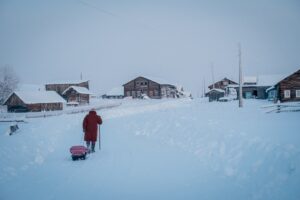Challenges and Opportunities in Providing Healthcare in Nunavut
Created in 1999, the territory of Nunavut has always faced significant challenges when it comes to healthcare and services, mainly due to its size, geographical isolation, and dependency on air travel to access villages and 25 communities.
Geographical and Demographic Challenges
We’ve already mentioned geographic isolation and limited accessibility due to flying being required for year-round travel. Patients are also often sent to bigger centers to receive treatment for certain conditions. Add to this a sparse population distribution and harsh climate conditions and you foster challenges in reaching remote communities as well as impact healthcare delivery.
Infrastructure and Resource Limitations
It’s no secret that the Great North presents fewer healthcare facilities, diagnostic testing tools, and specialized services. In these circumstances, quality emergency medical care becomes sparser, as do medical equipment and technology required for diagnostics and primary care.
Not only material resources are limited by these multiple factors, but there is also an important shortage of healthcare professionals when staffing Nunavut. The various recruitment difficulties directly impact how residents are treated.
Health Disparities and Social Determinants of Health
In addition to geographical elements, socioeconomics and determinants of health are responsible for healthcare challenges and health disparities in Nunavut, such as limited resources, food insecurity, poverty and many more.
Due to the prevalent poverty rates in the North, limited job opportunities lead to an unfavorable system, making it difficult for individuals to prosper amidst the high living costs.
Low income hampers access to healthy food, resulting in food insecurity, while limited resources in stores reduce purchasing power, further affecting community health. Marchildon & Torgerson reported in 2020 that 57% of households experienced food insecurity in 2017 and 2018, which is quite a disturbing number…
Housing issues emerge due to expensive construction and repair costs. Many are compelled to reside in substandard dwellings with inadequate ventilation, and sharing homes with extended family becomes a necessity to afford housing.
High rates of chronic diseases and mental health issues are also to be noted, as well as unfortunately elevated smoking and drug use rates.
Opportunities for Improvement
Communities face a scarcity of post-secondary programs, resulting in a shortage of local professionals like teachers, nurses, and doctors. Consequently, cultural competency in education and healthcare within the territory becomes limited.
Language barriers and inadequate access to culturally appropriate care, coupled with the lingering effects of historical trauma and colonization, significantly impact daily health outcomes. The presence of workers from Southern Canada with little knowledge of customs and traditions, along with significant linguistic barriers, contributes to the health struggles faced by the community.
As part of the opportunities for improvement, enhancing healthcare training and education programs for locals have been noted as possible solutions. Efforts are underway by local organizations to address the health challenges faced by Nunavut communities. However, effective collaboration between them and healthcare providers, particularly nurses from the South, is crucial.
How Nurses Can Help
By focusing on enhancing cultural competency in healthcare practices and ensuring better access to healthcare facilities and specialized services, we can contribute to narrowing the gap and supporting communities profoundly impacted by historical actions. Together, we can work towards healing and giving back to those we aim to serve.
Community health nurses play a vital role in the functioning of health centers. They are responsible for conducting primary assessments, offering treatment and consultations, and providing essential care during the pre- and postnatal periods.
Additionally, these nurses cater to patients with chronic conditions like high blood pressure or diabetes, ensuring their well-being through regular care and management. Immunizations are also a crucial part of their responsibilities, safeguarding the health of the community they serve.
Besides learning as much as possible about the local language and culture, nurses can sign up and become part of the positive change. We help you prepare for this experience and make sure that you possess the cultural sensitivity needed to succeed and support local endeavors.
With an experience up north, you can become an ambassador of the local communities and can have an impact on stakeholders and policymakers to prioritize healthcare in Nunavut!
Interested in learning more about remote healthcare? Visit our website to join our team!
Related ressources
If you want to know more about this subject, we recommend the following articles



